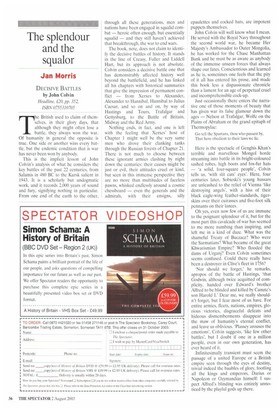The splendour and the squalor
Jan Morris
DECISIVE BATTLES by John Colvin Headline, £20, pp. 352, ISBN 0755310705 The British used to claim of themselves, in their glory days, that although they might often lose a battle, they always won the war. Of humanity in general the opposite is true. One side or another wins every battle, but the endemic condition that is war has never been won by anybody.
This is the implicit lesson of John Colvin's analysis of what he considers the key battles of the past 22 centuries, from Salamis in 480 BC to the Kursk salient in 1943. It is a scholarly but undogmatic work, and it records 2,000 years of sound and fury, signifying nothing in particular. From one end of the earth to the other, through all these generations, men and nations have been engaged in squalid combat — heroic often enough, but essentially squalid — and they still haven't achieved that breakthrough, the war to end wars.
The book, note, does not claim to identify the decisive battles of history. It stands in the line of Creasy, Fuller and Liddell Hart, but its approach is not absolute. Colvin considers a decisive battle one that has demonstrably affected history well beyond the battlefield, and he has linked all his chapters with historical summaries that give the impression of permanent conflict — from Xerxes to Alexander, Alexander to Hannibal. Hannibal to Julius Caesar, and so on and on, by way of Hastings and Tours, Trafalgar and Gettysburg, to the Battle of Britain, Midway and the Red Army.
Nothing ends, in fact, and one is left with the feeling that Xerxes' host of Chapter 1 might well be the very same men who drove their clanking tanks through the Russian forests of Chapter 21. There is not much to choose between these ignorant armies clashing by night down the centuries: their causes might be just or evil, their attitudes cruel or kind, but seen in this immense perspective they are no more than multitudes of faceless pawns, whisked endlessly around a cosmic chessboard — even the generals and the admirals, with their ensigns, silly epaulettes and cocked hats, are impotent puppets themselves.
John Colvin will well know what I mean. He served with the Royal Navy throughout the second world war, he became Her Majesty's Ambassador to Outer Mongolia, he has worked for the Chase Manhattan Bank and he must be as aware as anybody of the immense unseen forces that always shape our fates. Conscientious and learned as he is, sometimes one feels that the pity of it all has entered his prose, and made this book less a dispassionate chronicle than a lament for an age of perpetual cruel and incomprehensible cock-up.
Just occasionally there enters the narrative one of those moments of beauty that has given war its false glamour down the ages — Nelson at Trafalgar, Wolfe on the Plains of Abraham or the grand epitaph of Thermopylae:
Go tell the Spartans, thou who passest by. That here obedient to their laws we lie.
Here is the spectacle of Genghis Khan's terrible and marvellous Mongol horde streaming into battle in its bright-coloured sashed robes, high boots and fox-fur hats — 'a solid, four-square people', Colvin tells us, 'with slit cats' eyes'. Here, four centuries later, Sobieski's young hussars are unleashed to the relief of Vienna 'like destroying angels', with a hiss of their black eagle-wing feather-standards, tigerskins over their cuirasses and five-foot silk pennants on their lances.
Oh yes, even now few of us are immune to the poignant splendour of it, but for the most part this cavalcade of war has seemed to me more numbing than inspiring, and left me in a kind of daze. What was the shameful Treaty of Buczacz? Who were the Sarmatians? What became of the great Khwarismian Empire? Who flooded the dams of Urganj? Even Colvin sometimes seems confused. Could there really have been a destroyer in Clive's fleet in 1756?
'Nor should we forget,' he remarks, apropos of the battle of Hastings, 'that Godwin, although twice acquitted of complicity, handed over Edward's brother Alfred to be blinded and killed by Canute's son Harold I.' Dear me, we really shouldn't forget, but I fear most of us have. For entire armies, fleets, nations, empires, glorious victories, disgraceful defeats and hideous dismemberments disappear into the maw of humanity's eternal conflict, and leave us oblivious. `Plassey arouses the emotions', Colvin suggests, 'like few other battles', but I doubt if one in a million people, even in our own generation, has ever heard of it.
Infinitesimally transient must seem the passage of a united Europe or a British empire seen through the eyes of destiny, trivial indeed the baubles of glory, footling all the kings and emperors, Darius or Napoleon or Ozymandias himself: I suspect Alfred's blinding was entirely unnoticed by the playful gods up there.


























































 Previous page
Previous page